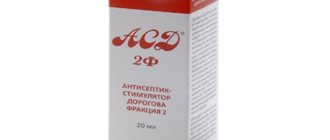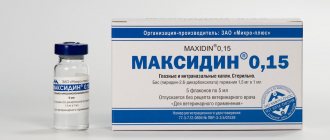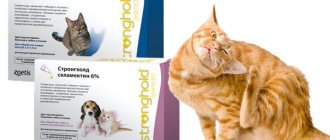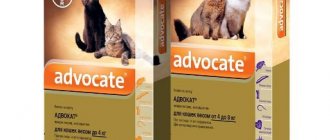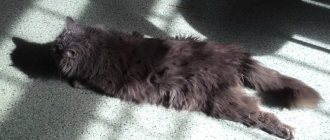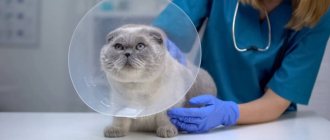Despite the fact that cats naturally have a well-developed sense of smell, cases of poisoning in them are not uncommon. Cats are very curious animals and quite often turn their attention and taste objects that interest them on the floor or ground.
A cat, unlike a dog, cannot be taught not to pick up food from the ground, nor to hunt mice, insects and birds.
The main reason that can cause poisoning in a cat is the hunting instinct inherent in them during the process of evolution.
When walking outside, cats take great pleasure in hunting for mice, small birds, butterflies and other insects. Outdoor cats are not averse to trying growing green plants, which are sometimes poisonous.
Often the cause of food poisoning in cats is eating food contaminated with bacteria and prohibited “treats”.
Causes of poisoning in cats
Poisoning in cats occurs as a result of:
- Eating low-quality and spoiled food products. Food left in a bowl often spoils, especially when owners leave it for the cat to eat all day. Your cat may find spoiled food in the trash. Spoiled food in cats is the most common cause of animal poisoning.
- Medications. Drug poisoning in cats occurs during self-medication, when medications are given to the cat in an increased dose, giving drugs that are prohibited for cats. Cats can eat medications you use in their treatment that are left in an accessible place.
- Poisoning with rat poison. In cities and country houses, due to the large number of rodents (mice, rats), zinc phosphide is used as control when carrying out deratization work. This drug is used in the form of bait. Its actions are based on the fact that the anticoagulant included in its composition disrupts blood clotting in the person into whose body it enters. The anticoagulant accumulates (cumulates), so death does not occur immediately, but gradually. Poisoning by rat poison in a cat can occur not only due to eating bait with it, but also after eating a poisoned rodent - mouse, rat (poisoning of animals with zinc compounds).
- Eating poisonous plants. Usually cats, while walking, feel which herbs they come across during a walk can be eaten and which are dangerous. Living in a room, cats often, out of curiosity, and also in order to cleanse the stomach of lumps of hair and other substances that have entered the stomach, begin to try indoor plants, which are sometimes dangerous for them. Dangerous plants are usually classified as: ficus; alocasia; ivy; Dieffenbachia; dracaena; digitalis; syngonium; philodendron; exotic plants.
When engaging in indoor floriculture, try not to purchase plants that can cause the development of poisoning in cats. For cats that do not leave their house or apartment, taking into account the physiological needs of the cat’s body, it is advisable to purchase containers with sprouted grass and cereals from a veterinary pharmacy.
Household chemicals. Poisoning in a cat can occur if owners do not thoroughly wash away detergents from the cat's feeding dishes. When sniffing, licking and when a cat chews household chemicals in the bathroom. A cat can become poisoned by household chemicals by inhaling them through the lungs, fur, etc.
Bites of poisonous insects, snakes. Being a predator by nature, a cat, once outside, especially in the summer, begins to realize its predatory instinct, trying to catch bees crawling on the flowers of plants. If a cat has not previously interacted with bees, then this can end quite sadly for her. With the onset of the warm season, bees in search of nectar are regular visitors to flowering plants, and of course the bee is not to blame when a cat or kitten tries to play with it (The cat was bitten by a bee (wasp) - what to do?).
Severe helminthic infestation. Worms in a cat's body, in addition to mechanical damage to tissues and the development of intestinal bleeding, cause severe poisoning of the body (worms in a cat).
Pesticides, insecticides, herbicides used by owners for garden crops and ornamental plants. Cats are very clean animals and constantly take care of their hygiene. When washing the face with a paw, after visiting plants treated with pesticides, it introduces these substances into the oral mucosa, which can cause poisoning.
Signs and superstitions surrounding dracaena
Good signs about the dragon tree include the following:
- dracaena is considered a tree of love, which brings peace, prosperity and mutual understanding to the home;
- the plant successfully absorbs negative energy;
- the dragon's tail promotes material well-being by bringing money into the house;
- the flower improves mood, removes apathy and prolonged depression, has a sedative effect and gives strength;
- Dracaena brought as a gift to a lonely person allows him to hope for finding a partner in the near future.
It is very good to receive Dracaena as a gift, since it is considered a symbol of happiness and prosperity in the family.
The flowering of dracaena is considered a special sign of fate and foreshadows large financial gains or career growth.
Dracaena rarely blooms and therefore this is considered a very good sign.
One of my friends, who is a fan of Feng Shui, always gives the newlyweds dracaena for their wedding as a symbol of the guardian of the hearth. The more magnificent the foliage on the tree in the future, the stronger the mutual love of the spouses.
The more well-groomed the tree and the more lush its foliage, the stronger the love of the spouses
There are also unfavorable superstitions:
- a plant that has died for no apparent or explicable reason warns of a serious illness of one of the spouses, his death or leaving the family;
- Drying and diseased leaves indicate impending financial losses, dismissal or imminent separation from a loved one.
If dracaena suddenly dies, then this is a very alarming and bad sign.
Video: signs and superstitions about dracaena
Symptoms of poisoning in cats
Depending on the amount and toxicity of the poison, the duration of its effect on the cat’s body, the symptoms of poisoning may not always be very pronounced.
Depending on what the cat was poisoned with, the degree of toxicity and the amount of toxic substance that entered the animal’s body, the first symptoms of poisoning may appear after 6-8 hours. When poisoned by potent toxins or poisonous plants, symptoms of poisoning in a cat appear a few minutes after entering the gastrointestinal tract.
Symptoms of poisoning in cats:
Nausea progressing to vomiting. Before vomiting begins, the cat becomes very nauseous, the cat behaves restlessly, randomly moving around the room from place to place, makes constant swallowing movements, and meows pitifully. After some time, the cat begins to cough, tilt and stretch its head forward, and breathe frequently and deeply. After all this, the cat begins to contract in the abdomen and throat, ending with vomiting (vomiting in cats).
Diarrhea. During the day, a healthy cat goes to the toilet 1-2 times. With diarrhea, the cat begins to defecate much more often, while the volume of liquid feces in the cat's litter box becomes smaller each time, the feces become from pasty to watery, the color of the feces varies from black to red (with bleeding in the gastrointestinal tract) - diarrhea in cats.
Severe drooling. When a cat is poisoned, owners often notice severe drooling (the cat is drooling).
Decreased appetite to the point of refusing to feed.
Increased thirst. As a result of poisoning, the cat experiences severe dehydration (loss of fluid as a result of vomiting and diarrhea) and the cat drinks a lot to replenish lost fluid.
A sharp decrease in body temperature; sometimes a poisoned cat may have a fever.
Inadequate reaction of the pupils to light or lack of reaction (the pupils are constantly dilated or constricted).
Weakness, apathy, unsteady gait and drowsiness of a poisoned cat.
Pain on palpation of the abdominal area.
Visible mucous membranes become pale and icteric.
Inappropriate reaction to external stimuli.
In case of severe poisoning, the cat experiences shortness of breath, an increased pulse rate, and cardiac arrhythmias (bradycardia, tachycardia, arrhythmia). Poisoning with chemicals and poisons leads to impaired coordination of movements, paralysis and paresis of the limbs, severe agitation, and muscle spasms of individual muscles appear.
As a result of poisoning, the cat can be aggressive or, on the contrary, depressed. They try to hide in a dark corner of the room and meow constantly.
When bitten by insects, a cat develops allergic reactions, dermatitis (dermatitis in cats).
What to do if a cat ate a dangerous flower?
If your cat begins to show symptoms of poisoning, you should contact your veterinarian as soon as possible. When contacting, it is advisable to know which flower your pet likes, in order to tell the doctor about it and get a more precise prescription from a specialist for treatment. First aid can be provided at home before going to the doctor - induce vomiting with saline solution no later than 2 hours after the incident, and also give the drug "Adsorbent".
First aid for poisoning
Having noticed the first symptoms of poisoning, cat owners should immediately contact their veterinary clinic. Where veterinary specialists, after conducting a clinical examination and diagnostic studies, will carry out the necessary therapeutic measures.
Considering that some poisonous substances have an immediate effect on the vital organs of the animal, and sometimes owners do not have the opportunity to urgently contact their veterinary clinic or call a doctor at home, owners must be able to provide first aid in case of poisoning.
In the case when you are sure that your cat’s poisoning is caused by poor-quality food, to normalize the cat’s general condition, we give the cat emetics (apomorphine, detox).
In order to neutralize toxins in the stomach and provoke vomiting in the cat, through a syringe without a needle, pour a weak solution of potassium permanganate and baking soda into the oral cavity at the rate of one part soda to four parts water.
To cleanse the stomach and provoke vomiting, you can pour warm boiled water or a decoction of medicinal chamomile into the cat’s mouth with a disposable syringe every 15 minutes. By this we achieve a reduction in intoxication and dehydration of the body.
Warm enemas from decoctions of medicinal herbs (plantain, yarrow, St. John's wort, chamomile) will help alleviate the condition of a poisoned animal.
After carrying out these cleansing procedures in order to remove the toxins remaining in the cat’s body, crushed activated carbon (1 tablet per 5 kg of body weight) or enterosgel, atoxil is given inside.
A good result in case of poisoning of cats can be obtained by giving mucous coating substances that cover the gastric mucosa and stop the absorption of poisons into the blood. Coating substances usually include flax seed decoction, rice decoction, chicken egg white, and tannin.
In case of poisoning with heavy metal salts, it is necessary to use raw chicken protein, then pour a warm saline solution or a large amount of boiled warm water into the cat’s mouth to induce vomiting.
In the case where cat poisoning is caused by household chemicals as a result of contact with the fur, the fur is thoroughly washed with water using laundry soap or animal shampoo. Induce vomiting by placing 8-10 grams of table salt on the root of the tongue. Decoctions of medicinal herbs are poured into the oral cavity with a syringe, and activated charcoal is given.
In case of acid poisoning, the cat must be given a solution of soda to drink (1 teaspoon per 200 ml of water). Inducing vomiting is prohibited.
Alkali poisoning. Take 2.5 tablespoons of lemon juice and mix with 3 tablespoons of water and drink it to the cat. Inducing vomiting is prohibited.
When stung by a bee. Carefully examine the site of the bee sting and try to remove the bee sting. We squeeze the wound from a bee sting with two fingers and try to remove some of the bee venom that has entered the wound. We treat the wound from a bee sting with any disinfectant. To remove the tumor, make a compress of baking soda and boiled water. Apply ice or a cold compress to the site of inflammation. To relieve an allergic reaction, we give an antihistamine:
Prednisolone. At home, 0.5 tablets are required. Turn the tablet into powder, dilute it with water and pour it into the cat’s mouth. In cases where immediate relief of an allergic reaction is required, the cat is given an intramuscular injection and 0.5 ml of solution is injected.
Dexamethasone. Used for obvious signs of allergy - vomiting, nausea, difficulty breathing. An injection is given with a solution of 0.2 ml.
Diazolin. It is recommended if a bee has bitten a kitten, an adult cat, or a cat. Dose – 0.5 tablets at a time. On the first day, an antihistamine is given three times.
If swelling is severe, it may be helpful to give your cat a diuretic.
We give the stung cat rest and calm it down.
Treatment of poisoning in a veterinary clinic
Before starting to treat a cat with poisoning, the doctor must obtain from the owner information about what, in the owner’s opinion, the cat was poisoned with, whether there was vomiting (it would be a good idea for the owner to take a sample of the vomit with him), whether there was diarrhea, what chronic diseases your cat has, and etc. A quick clinical examination is carried out and resuscitation measures begin.
The cat is given a drip with 40% glucose. General stimulants (Gamavit, Katazol, Vitam, Vitamin C) and detoxifying drugs, hepatoprotectors (Essentiale), cardiac drugs (camphor, caffeine, cordiamine), antiemetics (Cerucal), and antidiarrheal drugs are administered intravenously. In case of severe poisoning, the drip to the cat is repeated every other day.
To normalize water-salt metabolism, the cat is injected intravenously with Ringer's solution. When treating poisoning, veterinary specialists also use antispasmodics - no-shpa, baralgin.
In order to speed up the elimination of poisons that have entered the body, diuretics are prescribed.
Depending on the general condition of the body, a veterinarian may additionally resort to symptomatic treatment.



